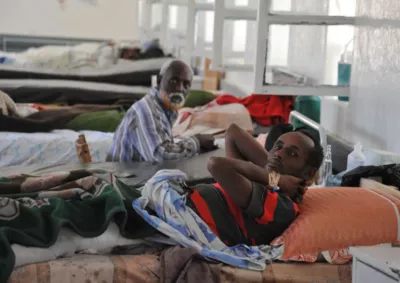NEWS & INSIGHTS: Global Public Health
People in many parts of the world often consider public healthcare a basic human right. Africa, being the second-largest continent, houses a diverse range of challenges and opportunities within its healthcare sector. This post aims to offer an overview into Africa’s public healthcare landscape.
Over 1.3 billion people across 54 countries depend on Africa’s complex healthcare system. The system grapples with challenges such as a high disease burden, insufficient access to healthcare, inadequate infrastructure, and a scarcity of trained professionals. Yet, there’s a silver lining: the healthcare sector is making significant strides and innovating with new solutions.
The Disease Burden
Africa shoulders a heavy load of infectious diseases, including HIV/AIDS, malaria, and tuberculosis. Yet, the continent also grapples with a rising tide of non-communicable diseases like diabetes and cardiovascular diseases. This double burden places considerable pressure on its already vulnerable healthcare systems.
Access to Healthcare
 Accessibility to healthcare remains a significant challenge. Rural areas often lack the necessary healthcare facilities, and if present, they are usually under-resourced. To combat this, telemedicine initiatives are being adopted to bridge the gap.
Accessibility to healthcare remains a significant challenge. Rural areas often lack the necessary healthcare facilities, and if present, they are usually under-resourced. To combat this, telemedicine initiatives are being adopted to bridge the gap.
READ | Harnessing the Power of AI in Telemedicine: A New Frontier in Healthcare
Healthcare Infrastructure and Workforce
The healthcare infrastructure in many African countries is inadequate. The World Health Organization recommends a ratio of 2.3 healthcare workers per 1000 population. Most African countries fall short of this target.
Progress and Innovations
Despite these challenges, Africa has seen substantial progress in public healthcare. The use of technology and digital health, strengthened primary healthcare, and increased domestic and international investments are transforming the healthcare landscape.
Conclusion
While challenges persist in Africa’s public healthcare sector, the continent is on a positive trajectory towards improved health outcomes. Collaboration between governments, non-governmental organizations, and the private sector is critical in accelerating this progress.
At NIFDAR Consulting, we believe that effective, tailored public health solutions are a crucial part of this ongoing effort. We are here to support you in implementing successful programs designed to meet the unique needs of your organization, whether that involves proposal writing, program monitoring and evaluation, disease-specific programming, clinical epidemiology, capacity building, or any of our wide array of services.
Are you Interested in taking the next step towards achieving your public health goals? Get in touch with our team of experts today. We’re ready to work alongside you to create custom solutions that will drive significant impact in your community and beyond. Let’s together create a healthier future for Africa.”
Share This Post, Choose Your Platform!
People in many parts of the world often consider public healthcare a basic human right. Africa, being the second-largest continent, houses a diverse range of challenges and opportunities within its healthcare sector. This post aims to offer an overview into Africa’s public healthcare landscape.
Over 1.3 billion people across 54 countries depend on Africa’s complex healthcare system. The system grapples with challenges such as a high disease burden, insufficient access to healthcare, inadequate infrastructure, and a scarcity of trained professionals. Yet, there’s a silver lining: the healthcare sector is making significant strides and innovating with new solutions.
The Disease Burden
Africa shoulders a heavy load of infectious diseases, including HIV/AIDS, malaria, and tuberculosis. Yet, the continent also grapples with a rising tide of non-communicable diseases like diabetes and cardiovascular diseases. This double burden places considerable pressure on its already vulnerable healthcare systems.
Access to Healthcare
 Accessibility to healthcare remains a significant challenge. Rural areas often lack the necessary healthcare facilities, and if present, they are usually under-resourced. To combat this, telemedicine initiatives are being adopted to bridge the gap.
Accessibility to healthcare remains a significant challenge. Rural areas often lack the necessary healthcare facilities, and if present, they are usually under-resourced. To combat this, telemedicine initiatives are being adopted to bridge the gap.
READ | Harnessing the Power of AI in Telemedicine: A New Frontier in Healthcare
Healthcare Infrastructure and Workforce
The healthcare infrastructure in many African countries is inadequate. The World Health Organization recommends a ratio of 2.3 healthcare workers per 1000 population. Most African countries fall short of this target.
Progress and Innovations
Despite these challenges, Africa has seen substantial progress in public healthcare. The use of technology and digital health, strengthened primary healthcare, and increased domestic and international investments are transforming the healthcare landscape.
Conclusion
While challenges persist in Africa’s public healthcare sector, the continent is on a positive trajectory towards improved health outcomes. Collaboration between governments, non-governmental organizations, and the private sector is critical in accelerating this progress.
At NIFDAR Consulting, we believe that effective, tailored public health solutions are a crucial part of this ongoing effort. We are here to support you in implementing successful programs designed to meet the unique needs of your organization, whether that involves proposal writing, program monitoring and evaluation, disease-specific programming, clinical epidemiology, capacity building, or any of our wide array of services.
Are you Interested in taking the next step towards achieving your public health goals? Get in touch with our team of experts today. We’re ready to work alongside you to create custom solutions that will drive significant impact in your community and beyond. Let’s together create a healthier future for Africa.”




